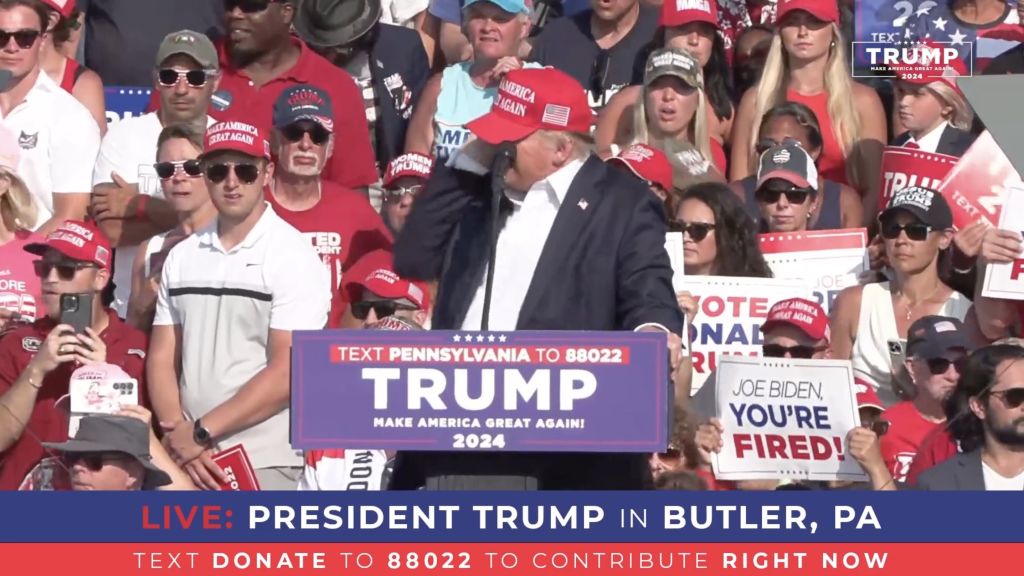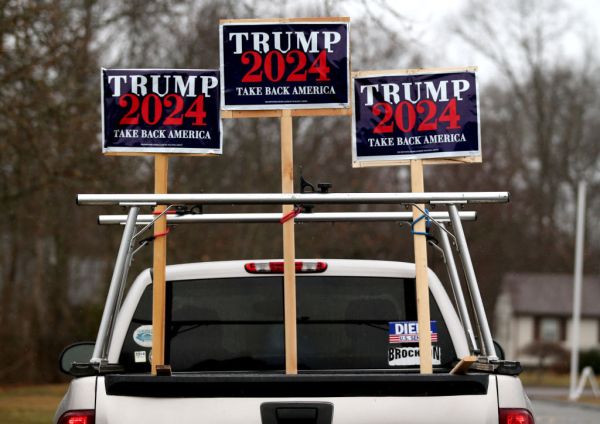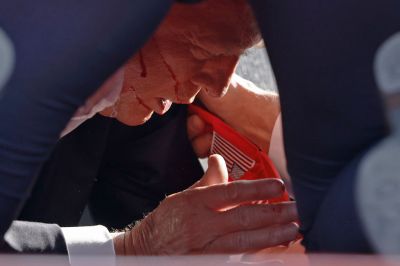At approximately 6:15 p.m. ET on Saturday, former President Donald Trump was shot at an outdoor campaign rally near Pittsburgh, Pennsylvania. A bullet pierced Trump’s right ear, but he was fortunately otherwise unharmed and, according to his family, is now “doing fine.” One rally attendee was killed and two others were critically injured in what law enforcement officials declared “an assassination attempt.” Secret Service agents killed the shooter on site.
New information continued to emerge in the wee hours of Sunday morning, but many key details remain unknown. We can expect partisans of all stripes will seek to exploit this tragic situation for political advantage in the coming days, offering narratives and conspiracy theories unsupported by facts. Indeed, some already have. But just hours removed from what could be one of the most consequential shootings in the last half-century, investigators are still gathering facts. So when it comes to amplifying reported information, caution is warranted.
Regardless of what we do learn, Saturday was a dark day for the country: 43 years after President Ronald Reagan was wounded in an assassination attempt and more than 60 years after President John F. Kennedy was killed by a sniper’s bullet, the attempted killing of a former president and current presidential candidate recalls a bleaker, more politically violent period in U.S. history.
Here’s what we do know. A few minutes after Trump took the stage at his campaign rally on farm grounds in Butler, Pennsylvania, about 45 miles north of Pittsburgh, gunfire erupted. A shooter fired multiple shots—potentially as many as eight—from an elevated position on the roof of a building outside the rally itself, about 400 feet from where Trump was speaking. Since the shooter never entered the grounds of the rally venue, he never had to pass through the security checks customary at Trump rallies. Posted on a rooftop on the other side of the rally stage, Secret Service snipers shot and killed the would-be assassin. An AR-style rifle was reportedly recovered from the scene.

Cameras were rolling, capturing the entire event on live television. Immediately after the first shots rang out, Trump touched his hand to his right ear and quickly ducked to the stage floor as Secret Service agents piled on to shield him from more bullets. Once the gunfire stopped, the agents pulled Trump up. The former president, with blood streaming from his ear and spread across his face, told the agents to let him get his shoes on as they tried to move off stage. He then stopped them again, raised his fist to the crowd, and seemed to mouth the word “fight” before he was ushered into a car and left the venue.
“I was shot with a bullet that pierced the upper part of my right ear,” Trump posted on his Truth Social account later Saturday night. “I knew immediately that something was wrong in that I heard a whizzing sound, shots, and immediately felt the bullet ripping through the skin. Much bleeding took place, so I realized then what was happening.”

The shooter killed one rally attendee and critically injured two others, according to the FBI and local law enforcement. The identities of those killed or injured had not been released as of Sunday morning, but authorities confirmed that all three are adult men. The crowd of Trump’s supporters was initially shocked by the gunfire, but once Trump raised his fist, attendees began to cheer. Misha Thomas, who was present at the rally, told TMD that as Trump left, people weren’t running or panicking.
Although the shooting played out on live television—with plenty of additional footage surfacing from those in attendance—many questions remain unanswered. The FBI identified the shooter as Thomas Matthew Crooks, a 20-year-old resident of Bethel Park, Pennsylvania. Multiple media outlets cited public records to report that Crooks donated to a Democratic Party-aligned group on January 20, 2021—the day of Biden’s inauguration—but registered as a Republican a few months later. Those claims have not been independently verified by The Dispatch.* Law enforcement officials who briefed reporters on the shooting said his motive is not yet clear.

Nor do we know how the shooting could have happened in the first place. Scrutiny will likely focus on how Crooks was able to get in position to take a shot at Trump from only a few hundred feet away. Were there lapses in security protocols that enabled the shooter to get so close? Two eyewitnesses claimed to have seen a man “bear crawling” on the roof of a nearby building, and said they tried to alert law enforcement officials before the gunshots began to ring out. In another video that emerged last night, attendees can be heard shouting, “He’s got a gun!” and “He’s on the roof!” moments before the pandemonium broke out. Did law enforcement fail to respond urgently enough to such warnings?
“There’s going to be a long investigation,” Kevin Rojek, the special agent in charge of the FBI Pittsburgh Field Office, said at a press conference around midnight Sunday, adding that it was “surprising” how many shots the gunman was able to fire. He also said that the Secret Service “needs to answer” the question of why the building the shooter fired from wasn’t secured in the first place. “We’re not in a position to start second-guessing how or why or anything at this point,” Pennsylvania State Police Lt. Col. George Bivens said during the press conference. “It is incredibly difficult to have a venue open to the public and secure against any possible threat, against a very determined attacker.” The Secret Service did not have a representative at the press briefing.
The assassination attempt was quickly and roundly condemned by lawmakers and leaders in both parties, including former presidents Barack Obama, George W. Bush, and Bill Clinton. “There is absolutely no place for political violence in our democracy,” Obama wrote. “Although we don’t yet know exactly what happened, we should all be relieved that former President Trump wasn’t seriously hurt, and use this moment to recommit ourselves to civility and respect in our politics. Michelle and I are wishing him a quick recovery.”
Senate Majority Leader Chuck Schumer said he was “relieved that former President Trump is safe,” and Senate Republican Leader Mitch McConnell condemned the violence and expressed his gratitude that Trump “appears to be fine after a despicable attack on a peaceful rally.” House Minority Leader Hakeem Jeffries wished Trump a “full and swift recovery,” adding that “political violence of any kind is never acceptable.”
President Joe Biden released a similar statement a few minutes before 8 p.m. ET, and reporters were notified that he would be delivering remarks from Rehoboth Beach, Delaware, where he often stays on weekends. “There’s no place in America for this kind of violence,” he said, noting he had tried to get in touch with Trump but was unsuccessful. “It’s sick. It’s sick.” A White House official later confirmed that Biden did end up speaking to Trump on the phone—notable given the two men’s bitter political rivalry. The Biden campaign also announced it has paused its communications and is pulling down its TV ads for the time being.
Many of the elected officials who spoke out last night have themselves been affected by political violence in recent years. “Political violence is terrifying. I know,” said former Democratic Rep. Gabby Giffords, who survived a gunshot wound to the head in a 2011 assassination attempt. “I’m holding former President Trump, and all those affected by today’s indefensible act of violence in my heart.” Former Speaker Nancy Pelosi—whose husband was violently attacked at their home in October 2022—“thank[ed] God that former President Trump is safe.”
But some such lawmakers moved beyond those expressions of gratitude. “I am praying for President Trump and all of those hurt at today’s rally,” House Majority Whip Steve Scalise—who was shot and severely wounded by a Bernie Sanders supporter at a practice for the congressional baseball game in 2017—said in a statement. “For weeks Democrat leaders have been fueling ludicrous hysteria that Donald Trump winning re-election would be the end of democracy in America. Clearly we’ve seen far left lunatics act on violent rhetoric in the past. This incendiary rhetoric must stop.”
Republican Sen. J.D. Vance of Ohio—currently on the shortlist to become Trump’s running mate—was even more explicit. “Today is not just some isolated incident,” he tweeted. “The central premise of the Biden campaign is that President Donald Trump is an authoritarian fascist who must be stopped at all costs. That rhetoric led directly to President Trump’s attempted assassination.” GOP Sen. Tim Scott of South Carolina echoed the sentiment.
Of course, both candidates have used apocalyptic language to warn about the consequences of a victory by their opponent. Biden has waved off calls to step down as the presumptive Democratic nominee in recent days, in part by warning that Trump poses an existential threat to the country. At a campaign event in Michigan on Friday, Biden warned that another Trump term would be “deadly serious” and that the former president poses a “threat to this nation.” According to a recording obtained by Politico, Biden used provocative language on a private call with donors on Monday: “I have one job, and that’s to beat Donald Trump. I’m absolutely certain I’m the best person to be able to do that. So, we’re done talking about the debate, it’s time to put Trump in a bullseye.”
Trump himself has also regularly employed heated rhetoric for years, with his incessant claims of the 2020 election being stolen famously contributing to hundreds of his supporters storming the U.S. Capitol on January 6, 2021. At one of his first campaign rallies this cycle—in Waco, Texas—Trump told his supporters that “2024 is the final battle.”
“The abuses of power that we’re currently witnessing at all levels of government will go down as among the most shameful, corrupt, and depraved chapters in all of American history. It’s happening right before your eyes,” Trump said in that March 2023 rally in Texas. “I was asked the other day, and I took a little heat for it. They said, ‘Who’s our biggest threat? Is it China, sir? Well, is it Russia?’ I said, “No. Our biggest threat are high-level politicians that work in the United States government like Mitch McConnell, Nancy Pelosi, Schumer, Biden, Justice Department—because that’s poisoning our country.”
The shooting is likely to reshape the Republican National Convention this week, but the Trump campaign said in a statement Saturday night that the former president “looks forward to joining you all in Milwaukee as we proceed with our convention to nominate him.” In a memo to campaign staff released this morning, top Trump aides Chris LaCivita and Susie Wiles confirmed the convention “will continue as planned,” though they encouraged campaign staffers in Washington, D.C., and West Palm Beach to “stay away from the office” as they assess the threat level and enhance the “armed security presence.”
In the hours immediately after the shooting—and before law enforcement officials identified the shooter—social media was filled with uninformed speculation and conspiracy theories about the assassination attempt. Some voices on the left irresponsibly claimed that the assassination attempt was staged to provide a boost to Trump’s presidential campaign—“staged” trended on X for hours after the shooting—while others baselessly speculated that the shots came from a BB gun. Irresponsible actors on the right speculated that the Secret Service or the Department of Homeland Security allowed—or even authorized—the attack to take place. “The ONLY question that matters—the ONLY question that needs to be answered—is who in the Biden regime authorized/allowed the assassination attempt on Trump,” Federalist CEO Sean Davis tweeted Saturday night. “We all know why this happened.” A sitting Republican congressman amplified those claims. “Joe Biden sent the order,” Rep. Mike Collins of Georgia tweeted after the shooting. “The Republican District Attorney in Butler County, PA, should immediately file charges against Joseph R. Biden for inciting an assassination.”
With partisan polarization already at a fever pitch, incentives will be high in the coming days and weeks to inflame the precarious situation even further. We can only hope and pray that cooler heads prevail. “We as Americans must do better,” former Secretary of State Condoleezza Rice said last night. “To repudiate violence, lower the temperature of the political debate, and uphold the hallmarks of a healthy democracy.”
Correction and Clarification, July 14, 2024: This newsletter originally said Thomas Matthew Crooks was from Bethel, Pennsylvania. He is from Bethel Park, Pennsylvania. The newsletter was also updated to make clear that The Dispatch has not independently verified claims that the gunman donated to Democratic-aligned groups or registered as a Republican.










Please note that we at The Dispatch hold ourselves, our work, and our commenters to a higher standard than other places on the internet. We welcome comments that foster genuine debate or discussion—including comments critical of us or our work—but responses that include ad hominem attacks on fellow Dispatch members or are intended to stoke fear and anger may be moderated.
With your membership, you only have the ability to comment on The Morning Dispatch articles. Consider upgrading to join the conversation everywhere.